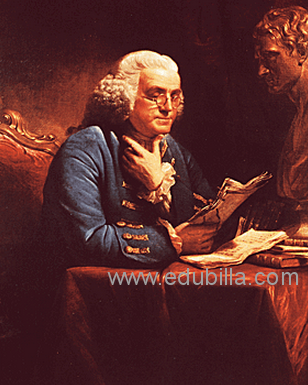










Benjamin Franklin was one of the Founding Fathers of the United States and in many ways was "the First American".A renowned polymath, Franklin was a leading author, printer, political theorist, politician, postmaster, scientist, inventor, civic activist, statesman, and diplomat. As a scientist, he was a major figure in the American Enlightenment and the history of physics for his discoveries and theories regarding electricity. As an inventor, he is known for the lightning rod, bifocals, and the Franklin stove, among other inventions.He facilitated many civic organizations, including Philadelphia's fire department and a university.
Franklin earned the title of "The First American" for his early and indefatigable campaigning for colonial unity; as an author and spokesman in London for several colonies, then as the first United States Ambassador to France, he exemplified the emerging American nation.Franklin was foundational in defining the American ethos as a marriage of the practical values of thrift, hard work, education, community spirit, self-governing institutions, and opposition to authoritarianism both political and religious, with the scientific and tolerant values of the Enlightenment. In the words of historian Henry Steele Commager, "In a Franklin could be merged the virtues of Puritanism without its defects, the illumination of the Enlightenment without its heat."To Walter Isaacson, this makes Franklin "the most accomplished American of his age and the most influential in inventing the type of society America would become."
Franklin, always proud of his working class roots, became a successful newspaper editor and printer in Philadelphia, the leading city in the colonies.With two partners he published the Pennsylvania Chronicle, a newspaper that was known for its revolutionary sentiments and criticisms of the British policies. He became wealthy publishing Poor Richard's Almanack and The Pennsylvania Gazette. Franklin was also the printer of books for the Moravians of Bethlehem, Pennsylvania (1742 on). Franklin's printed Moravian books (printed in German) are preserved, and can be viewed, at the Moravian Archives located in Bethlehem. Franklin visited Bethlehem many times and stayed at the Moravian Sun Inn.
He played a major role in establishing the University of Pennsylvania and was elected the first president of the American Philosophical Society. Franklin became a national hero in America when as agent for several colonies he spearheaded the effort to have Parliament in London repeal the unpopular Stamp Act. An accomplished diplomat, he was widely admired among the French as American minister to Paris and was a major figure in the development of positive Franco-American relations. His efforts to secure support for the American Revolution by shipments of crucial munitions proved vital for the American war effort.
For many years he was the British postmaster for the colonies, which enabled him to set up the first national communications network. He was active in community affairs, colonial and state politics, as well as national and international affairs. From 1785 to 1788, he served as governor of Pennsylvania. Toward the end of his life, he freed his own slaves and became one of the most prominent abolitionists.
His colorful life and legacy of scientific and political achievement, and status as one of America's most influential Founding Fathers, have seen Franklin honored on coinage and the $100 bill; warships; the names of many towns; counties; educational institutions; corporations; and, more than two centuries after his death, countless cultural references.
Early life in Boston
Benjamin Franklin was born on Milk Street, in Boston, Massachusetts, on January 17, 1706,and baptized at Old South Meeting House. He was one of ten children born to Josiah Franklin with his second wife Abiah Folger. Among Benjamin's siblings were his older brother James and his younger sister Jane.
Josiah wanted Ben to attend school with the clergy, but only had enough money to send him to school for two years. He attended Boston Latin School but did not graduate; he continued his education through voracious reading. Although "his parents talked of the church as a career" for Franklin, his schooling ended when he was ten. He worked for his father for a time, and at 12 he became an apprentice to his brother James, a printer, who taught Ben the printing trade. When Ben was 15, James founded The New-England Courant, which was the first truly independent newspaper in the colonies.
When denied the chance to write a letter to the paper for publication, Franklin adopted the pseudonym of "Mrs. Silence Dogood", a middle-aged widow. "Mrs. Dogood"'s letters were published, and became a subject of conversation around town. Neither James nor the Courant's readers were aware of the ruse, and James was unhappy with Ben when he discovered the popular correspondent was his younger brother. Franklin was an advocate of free speech from an early age. When his brother was jailed for three weeks in 1722 for publishing material unflattering to the governor, young Franklin took over the newspaper and had Mrs Dogood (quoting Cato's Letters) proclaim: "Without freedom of thought there can be no such thing as wisdom and no such thing as public liberty without freedom of speech."Franklin left his apprenticeship without his brother's permission, and in so doing became a fugitive.

